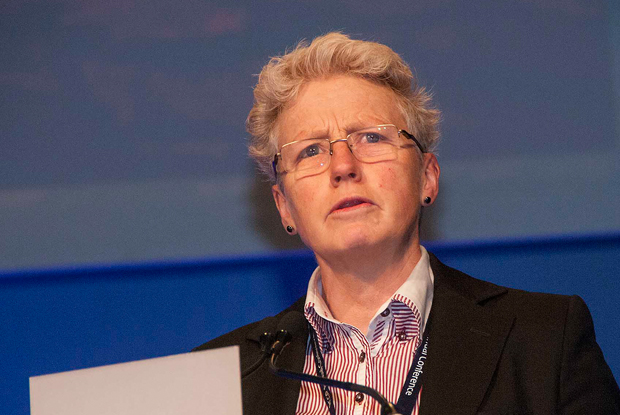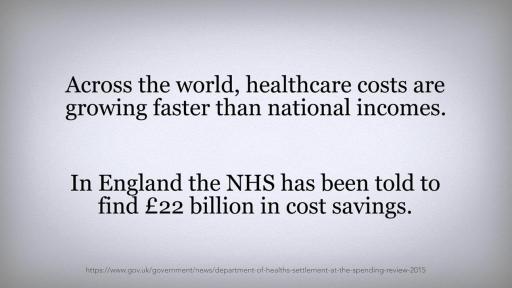New survey shows UK public willing to pay £10 for missed GP appointments to support the NHS amid widespread concerns about government spending on healthcare
Poll conducted in advance of this year’s ASTELLAS INNOVATION DEBATETM also demonstrates public are open to an additional ‘health tax’ to support improved NHS services, but clinicians fear additional charges will hit the poorest hardest
Chertsey, Surrey, Monday 8th February 2016
Although the NHS is ranked as one of the institutions that makes people ‘most proud to be British’1, a new poll commissioned by Astellas Pharma Europe Ltd, highlights that 91% of people feel that the health service is in need of change2. In particular, shorter waiting times (36% of respondents) and improved access to medicines (30%) rank most highly as the areas in need of greatest reform.

With only 1 in 4 of respondents agreeing that the Government currently spends enough on health, the survey reveals that those polled would be willing to accept an average charge of £10 for a missed GP appointment in order to improve service levels. The people polled also said they would be willing to pay an average of £170 per year in additional income tax for healthcare funding – which could result in approximately £5 billion in additional tax revenue for the Treasury3. In addition to these charges, 39% of those polled would be willing to accept an additional charge if it meant quicker access to healthcare services and 44% of those polled would be willing to accept additional charges if it meant access to newer and potentially more effective medicines.
It is estimated that more than 12 million GP appointments are missed each year, costing the NHS in excess of £162 million4. This means, over 8 appointments are missed per week for every full-time GP, with missed appointments leading to longer waiting times for patients5. The new survey shows that over 70% of respondents would be willing to pay a charge for a missed appointment; of those who were willing to pay, the average accepted charge would be £10.832. In addition, half of those polled would also be willing to accept an appointment with our doctor by webcam if it could make it easier to get an appointment.
At present, however, clinical opinion remains resistant to the introduction of charges, with some leading clinicians fearing that such charges will only hit the most vulnerable and in need of support. Professor Trisha Greenhalgh, Professor of Primary Healthcare and panellist at this year’s Innovation Debate comments: “Charging people to attend their GP would be a false economy, because some people (especially poor people) with early, treatable disease would delay attending until their symptoms got a bit worse. Inevitably, this will mean that we will fail to diagnose some cancers until they have spread; we will not pick up some type 2 diabetes until it has damaged the eyes and the kidneys; and we will push some heart attacks and strokes beyond the window when early treatments could have improved survival.”
”Furthermore, we will add a layer of expensive paperwork to the system, which will eat into any savings. I have no doubt that this strategy will save little money in the short term and will generate huge financial and human costs in the longer term.”
Others suggest that the reduction of missed appointments (sometimes referred to as DNAs – ‘did not attends’) can be realised through supply of more timely appointments. Virginia Patania, Practice Manager at the Jubilee Street Practice, comments that: “there is evidence to demonstrate that DNA rates are closely linked to delays between appointments and the time of their booking. Same day or 48-hour clinical triage systems demonstrate not only higher levels of patient satisfaction and better use of limited clinical resource, but DNA rates of 2% or less. This suggests that investment would be most wisely directed towards refining out of date, over stretched appointment systems, rather than on financially penalizing patients in need of care.”
‘Greater patient responsibility for managing their own health’ was the number one response given by healthcare professionals in a separate Astellas survey when asked ‘what would most improve our healthcare system overall’, followed closely by ‘increased funding’ (37%)6.
Other innovative approaches to reduce missed attendance have been trialled by Imperial College London, the Department of Health and the Behavioural Insights Team, which looked at the causal relationship between sending patients text messages and the rate of missed hospital appointments7. The study found that sending a text to the patient ahead of an appointment stating the cost of the appointment had the most significant impact on reducing missed appointments (by 23%), in comparison to other interventions including texts that didn’t include a cost.
As part of this year’s debate, we also asked leading authorities in the NHS, as well as members of the public, what they would be happy to see go from the NHS in order to balance the books. A film capturing these insights can be found here.
Follow the debate on Twitter via @AstellasINNOV8 or #innovatedebate
APEL/15/0054/EUat
Date of preparation: February 2016
References
- Ipsos MORI, What it means to be British: Final Topline results, February 2012. Available online via: https://www.ipsos-mori.com/Assets/Docs/c4_full%20topline.PDF
- Astellas Data on File. Astellas Innovation Debate combined survey findings - APEL/15/0097/EU
- Calculations based on HMRC projections for number of basic and higher-rate taxpayers in England in 2015-15 (est – 28,650,000), with each paying an additional annual contribution of £170.16. HMRC statistics are available online here (Table 2.1): https://www.gov.uk/government/statistics/number-of-individual-income-taxpayers-by-marginal-rate-gender-and-age
- NHS England, NHS England using technology to beat cost of missed appointments, March 2014. Available online via: https://www.england.nhs.uk/2014/03/missed-appts/
- GP Online, Exclusive: Patients fail to show up for 14m GP appointments a year, June 2015. Available online via: http://www.gponline.com/exclusive-patients-fail-show-14m-gp-appointments-year/article/1351972
- Astellas Date on File. Astellas Innovation Debate HCP Survey - APEL/15/0096/EU
- Department of Health, Research and analysis: A zero cost way to reduce missed hospital appointments, January 2016. Available online via:https://www.gov.uk/government/publications/reducing-missed-hospital-appointments-using-text-messages/a-zero-cost-way-to-reduce-missed-hospital-appointments
For more information, please contact:
Emma White
Communications Manager
Astellas Pharma EMEA
Mobile: +44 (0)7786 312 623
Email: [email protected]
About The Astellas Innovation Debate:
The annual ASTELLAS INNOVATION DEBATE brings together some of the world’s most progressive thinkers to discuss the role of innovation in addressing the greatest challenges of our time. Previous debates have focused on innovation in a time of austerity, population ageing, and what the DNA and data revolutions mean for our health. World-leading experts such as Nobel Laureates Professor Sir Andre Geim and Dr Elizabeth Blackburn; Lord Robert Winston; Professor John Appleby; Dr Leroy Hood; Baroness Helena Kennedy; Professor Lionel Tarrasenko and Professor Rolf Stahel have tackled some of the biggest challenges affecting science and scientific discovery.
This year, broadcaster and presenter Jonathan Dimbleby will chair a panel of world-leading experts for the fourth ASTELLAS INNOVATION DEBATE - Situation Critical: Making Healthcare Fit for the Future, taking place on Thursday 25th February 2016 at the Royal Institution of Great Britain.
In front of an invited audience of key figures from the worlds of science, medicine, politics and business, they will debate the biggest questions about the future of healthcare. Professor Trisha Greenhalgh is a Professor of Primary Care Health Sciences, Nuffield Department of Primary Care Health Sciences, University of Oxford, and one of this year’s panellists who will be debating the following critical questions:
- What role can innovation play in the drive for affordable healthcare?
- What can we learn from healthcare reforms in different countries?
- Should we expect less from the state and take more responsibility for our own health?
- Is privatisation the key to improved productivity - or a threat to the principle of healthcare for all?
- Should we simply pay more tax?
About Astellas Pharma Europe Ltd.
Astellas Pharma Europe Ltd. operates in 40 countries across Europe, the Middle East and Africa, and is the EMEA regional business of Tokyo-based Astellas Pharma Inc (Astellas). Astellas is a pharmaceutical company dedicated to improving the health of people around the world through the provision of innovative and reliable pharmaceuticals. The organisation's focus is to deliver outstanding R&D and marketing to continue growing in the world pharmaceutical market. Astellas’ presence in Europe also includes an R&D site and three manufacturing plants. The company employs over 4,500 people across the EMEA region.

